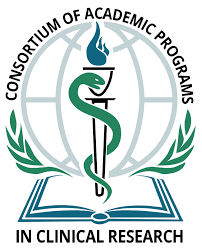The Workforce Engagement and Resilience team in DOCR supports outreach programs and pathways into the clinical research workforce. Click on the sections below to navigate this page.
State-Registered Clinical Research Apprenticeship
The DOCR State-Registered Clinical Research Apprenticeship Program is the first registered clinical research apprenticeship in North Carolina and one of the first in the Nation. Apprenticeships are designed to provide a direct and clear pathway for students enrolled in specific clinical research degree programs into a career at Duke. Pre-apprenticeship and apprenticeship programs provide on-the-job training and protected time for supplemental education. The apprenticeship is a collaboration between DOCR and Duke Clinical Research Units, ensuring apprentices receive supplemental education hours and on-the-job training with an experienced mentor.
The program is being piloted with our partners at Durham Technical Community College with pre-apprentices and apprentices recruited from the Clinical Trials Research Associate degree program.
Durham Technical Community College*: Education via Clinical Trials Research Associate's Degree
ApprenticeshipNC: NC state registration for program and liaison with U.S. Department of Labor
Association for Clinical Research Professionals (ACRP): Apprentice assessments and pathways to certification
*Pre-apprentices and apprentices from other clinical research degree programs can be considered for this program, subject to approval from DOCR.
Program Details:
-
Positions may be opened for individuals who are currently enrolled in a clinical research degree program (Pre-Apprentice) or who have recently completed a clinical research degree program (Apprentice).
-
Apprentices are required to have protected time for 144 hours of supplemental education (provided by DOCR or other approved entities) and on-the-job training within a clinical research unit.
-
Units collaborate with DOCR to define agreements and expectations, hire individuals into the program, track training hours, assess apprentice competency, and report career progression.
-
Pre-Apprentices and Apprentices are hired into DOCR with a Memorandum of Understanding (MOU) for apprentice payment and placement within the unit upon successful completion.
Benefits:
- Accelerated Access and Timelines: Apprenticeship expands access and provides an accelerated pathway into an exempt clinical research professional career.
- Structured Learning and Mentorship: Apprenticeships create structured learning and mentorship opportunities that align with competency-based training standards and bridge the experience gap.
- Directly Relevant Education: Apprentices complete the longest-running associate's degree program in Clinical Trials Research from Durham Tech which is directly applicable to working at a clinical research site.
- Employee Retention: Apprenticeships are known to not only bring people into the workforce, but retain them too.
- Mentor Stipends: Mentors can receive stipends for pairing with an apprentice.
- Effort Sharing: A portion of effort will be covered to support required supplemental education time.
- Certification: Apprentices may have accelerated access to ACRP certification.
A Pre-Apprentice position may be opened in collaboration with DOCR to recruit individuals who are currently enrolled in an approved clinical research degree program. Pre-apprentices are part-time employees who are finishing their degree and are paid an hourly wage as they complete their field-work requirements with a clinical research study team at Duke.
Job Description | Clinical Research Pre-Apprentice - 0805
An Apprentice position may be opened in collaboration with DOCR to recruit individuals who have already completed an approved clinical research degree program. Those who successfully complete Pre-Apprenticeship requirements and team expectations are eligible to progress into the Apprentice position via re-classification. Apprentices are full-time employees who are paid hourly while completing 144 hours of supplemental education through Duke offerings and receiving 1 year on-the-job experience and training from a study team.
Job Description | Clinical Research Apprentice - 0806
Interested in Hiring an Apprentice?
If your unit is interested in hiring an apprentice, please reach out to the Workforce Engagement and Resilience team in DOCR at wer-jobs@duke.edu for more information.
Clinical Research Internships
DOCR supports pathways into clinical research internships at Duke. Expand the sections below to learn more about available internship options and the key differences between unpaid internships through the Clinical Research Internship Portal (CRISP) and paid intern positions.
For more details on hiring or hosting interns, refer to the MyRESEARCHPath Guide on Hiring and Engaging Personnel, Students, and Volunteers and the DOCR Policy on Process for Adding Duke Students, Unpaid Volunteers, and Visiting Trainees/Interns to Study Personnel.
The Clinical Research Internship Portal (CRISP) is a collaborative initiative between the Duke CTSI Workforce Development team and DOCR to support students completing internships as part of their training programs. CRISP is designed to:
-
Streamline the process of matching students with departments that align with their academic and career interests.
-
Manage affiliation agreements between Duke and academic institutions, ensuring clear placement parameters.
-
Facilitate an efficient onboarding process for students entering Duke’s clinical research environment.
For more information on CRISP internships, visit the CRISP website.
Duke study teams may also post paid internships and entry-level roles to hire individuals seeking hands-on experience. CRISP and DOCR do not provide matching services for these paid positions.
If your study team is interested in hiring a paid intern, consider one of these hiring options:
-
Duke Temporary Employee: A short-term, paid position offering flexible staffing solutions for various project needs.
-
Duke Work-Study Student: A federally funded position for eligible Duke students seeking paid research experience.
-
Non-Duke Student/Intern Job Code: A temporary, paid internship for non-Duke students that focuses on providing project support and gaining general work experience. Ideal for students who are seeking practical, hands-on work assistance and exposure to a research environment.
-
Clinical Research Intern Job Code: A temporary internship designed for individuals who are typically in a "gap year" (one to two years) specifically to enhance their academic and professional profiles for application to graduate, medical, or other health professional schools. These are interns engaging in specific projects, contributing to publications, and receiving mentorship with objectives geared towards their academic and professional goals. Units interested in hiring into this job code can follow instructions on the DOCR WE-R Hiring Page to do so.
Clinical research internships supported by CRISP are designed as learning experiences, not as a substitute for staff positions. Duke Human Resources’ Policy on Volunteers and Unpaid Interns states that interns cannot replace employees or perform work that would typically require a hired staff member.
Key distinctions include:
-
Employment Status: Paid interns are hired into a specific role to support business needs, whereas unpaid interns through CRISP are here to learn.
-
Work Expectations: Paid positions have defined job responsibilities and performance expectations, while unpaid interns engage in structured learning experiences tied to their academic objectives.
-
Task Limitations: Unpaid interns have a more limited range of tasks they can perform, ensuring their experience remains educational rather than employment-based.
The Durham Early College of Health Sciences
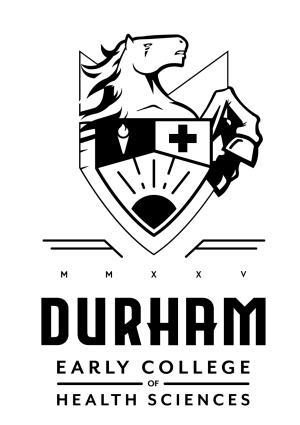
DOCR supports work-based learning experiences for the Durham Early College of Health Sciences (DECHS) clinical research pathway. DECHS is a collaboration launched in August 2025 between Duke Health, Durham Public Schools, and Durham Technical Community College, funded by Bloomberg Philanthropies for 5 years. The early college provides high school students with exposure and preparation for healthcare and clinical research careers through an innovative curriculum and hands-on learning experiences. This pathway is the first of its kind into the clinical research workforce.
Visit the Durham Early College of Health Sciences website and follow DECHS on Instagram and Facebook. Contact Emily Boone, Clinical Research Pathway Coordinator with questions.
The Durham Early College of Health Sciences (DECHS) is an innovative early college offering Durham County high school students the chance to earn their diploma and healthcare credentials or an associate degree, at no cost. Students will begin exploring four pathways, including clinical research, nursing, allied health, and surgical technology, before selecting a specific focus. As part of their education, students will participate in work-based learning opportunities hosted at Duke, providing hands-on experiences to explore each pathway. Early activities will include day camps and job shadowing, followed by internships and practical training in later years, offering students the opportunity to learn skills to transition directly into the workforce or pursue further education.
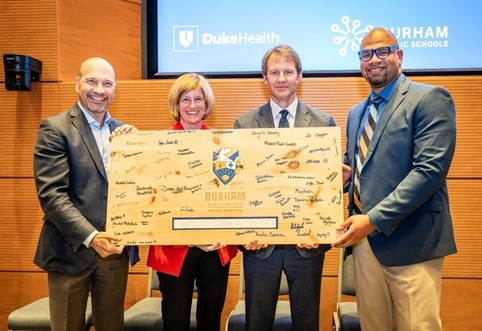

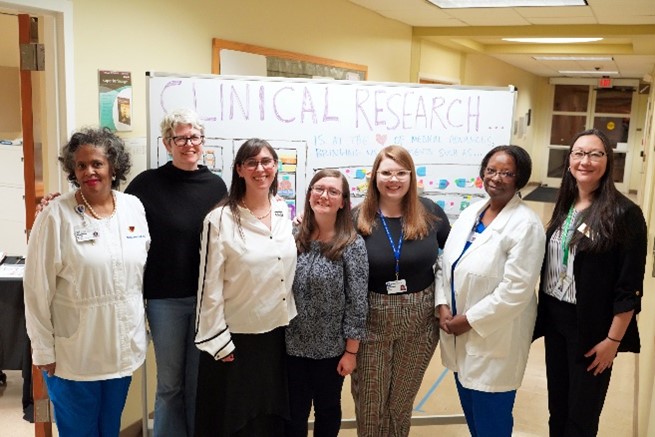
Check out these resources to learn more:
- Duke News & Media Video: First Day of Class: Durham Early College of Health Sciences
- Duke Today: Durham Public Schools Students Celebrate Opportunities to Pursue Careers in Health Care at Duke Health
- ABC11: Durham Early College of Health Sciences opens for 2025 school year
- Duke Video: Durham Early College of Health Sciences Signing Day
- Durham Public Schools: DECHS Signing Day Event Recap
- Duke Video: Dean Mary Klotman and Debra Clark Jones Discuss Duke and Community Partnership to Create Health Sciences Early College
- CTSI News Article: Prospective Students Explore Health Careers at Innovative New High School
- Duke Today Article: Duke Health Joins Innovative Partnership for Early College High School in Durham
- Duke Health News: Bloomberg Grant Funds Innovative Partnership for Early College High School in Durham
- Bloomberg Video, Jan 2024: Creating New High Schools to Graduate Students Directly into Healthcare Jobs | Mike Bloomberg
- Bloomberg Video, Dec 2024: New Specialized Healthcare High Schools in the U.S.
- Article: Empowering Our Future Workforce Requires Transforming High Schools
- ABC 11: Enrollment for Durham Early College for Health Sciences is now open
Inspire the Next Generation of Clinical Research Professionals!
Duke clinical research faculty and research teams have a unique opportunity to support this program and the students as they explore careers in research and healthcare. Whether you can inspire students with stories about your work, invite students into your space for tours and shadowing opportunities, host hands-on workshops or talks, mentor students so they can learn from real-world experiences, or host interns in your department, your involvement will make a lasting impact.
We offer three ways to get involved! Upon completion of the DECHS Volunteer Interest Form, you will be assigned a level of involvement based on your responses.
|
Level of Involvement |
Requirements |
Perks |
|---|---|---|
|
DECHS Ambassador Volunteer for occasional events such as classroom presentations, hands-on activities at various sites, job fairs, and day camps. |
Complete Minors in Duke Programs Policy Training annually and have a background check within last 3 years NOTE: DOCR team will facilitate access to these. |
DECHS t-shirt for events and DECHS enamel pin. |
|
DECHS Champion Opportunities beginning in 2026. Mentor students through a combination of shadowing opportunities at your work site, internship precepting, or serving as a journey worker mentor for apprentices. |
Complete the above, plus an interview to discuss fit and opportunity matching. |
Above plus free Positive Youth Development and Mentorship training, certificate of mentorship for advancement portfolio. |
|
DECHS Pathway Partner For those interested in supporting all of the above. |
Pathway Partners will complete all of the above. |
Above plus recognition on DOCR Pathways website and a digital Pathway Partner badge to showcase your involvement. |
Support from the Duke community will help inspire and prepare the next generation of healthcare and research professionals. We are looking for Ambassadors, Champions, and Pathway Partners to get involved with DECHS. Upon completion of the form, you will be assigned a level of involvement based on your responses.
Support Durham Early College of Health Sciences Student Experiences!
K-12 Outreach
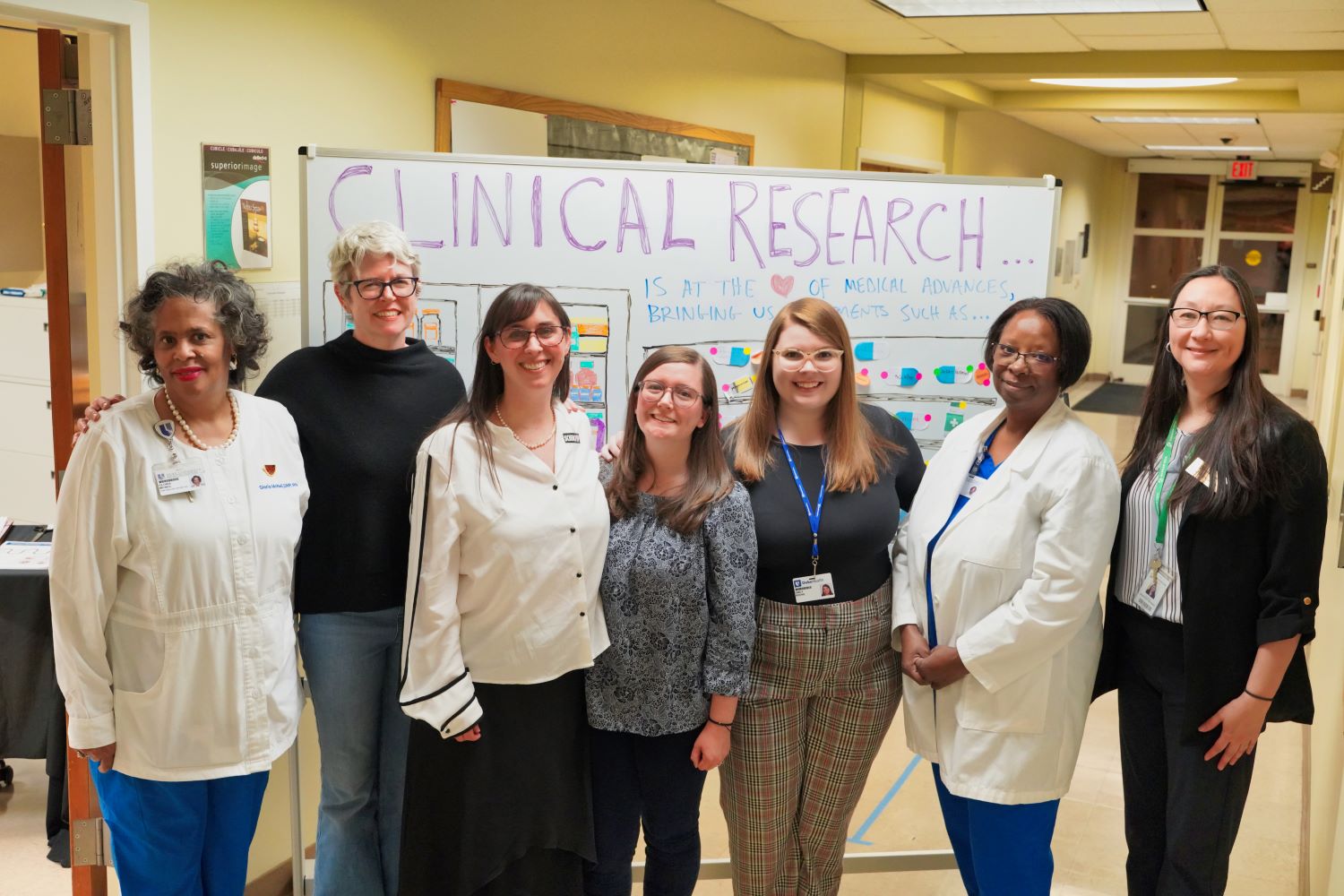
If you would like to get involved, please feel free to reach out to emily.boone@duke.edu for now. The team is working on a formal volunteer registry, coming soon!
DOCR partners with the Duke CTSI Workforce Development team to support K-12 outreach initiatives to inspire the next generation of clinical research professionals. Programs supported range from interactive sessions, educational events, job fairs, and partnerships with local schools. Clinical research professionals and faculty at Duke can get involved in K-12 outreach opportunities to share their expertise with the next generation.
Local Clinical Research Degree Programs
Clinical research degree programs provide a strong academic foundation for those interested in the field or looking to further their clinical research career. DOCR collaborates with several clinical research degree programs to provide internship opportunities and pathways to employment. Duke employees may be eligible for tuition assistance to support further education in clinical research. Learn more about Duke Tuition Assistance benefits.
A few programs to check out:
-
Durham Technical Community College – Clinical Trials Research Associate A.A.S. Program
-
North Carolina Central University (NCCU) – Clinical Research Sciences B.S. Program
-
Campbell University – Clinical Research B.S. and M.S.C.R. Programs
-
UNC Wilmington – Clinical Research B.S. Program (Online)
-
Wake Forest University – Clinical Research Management M.S. Program (Online)
-
The Ohio State University – Clinical Research M.S. Program (Online)
The Duke Office of Clinical Research is a member of the Consortium of Academic Programs in Clinical Research (CoAPCR).
CoAPCR facilitates the development of high-quality educational programs encompassing all areas of clinical research that are based in academic credit-granting institutions.
You can find other degree programs in the CoAPCR Membership Directory.










